KARMA, Iraq — Abdulmun’em Shafi hid inside his house, terrified to make a sound in case ISIS fighters heard him.
Like his fellow residents in Karma, the 50-year-old engineer had been ordered by the extremists to travel to the nearby city of Fallujah to prepare for an assault by Iraqi government forces.
"They forced locals to leave for Fallujah in order to use them as human shields," Shafi told NBC News Thursday from a refugee camp northeast of the town.
The father-of-eight and his family were among the residents who managed to evade ISIS' decree.
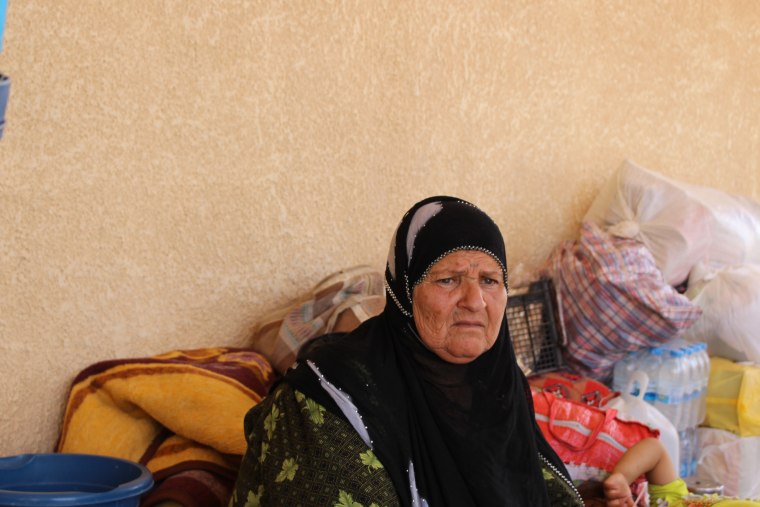
"I was able to hide inside my house for four days without making any noise, fearing that they would discover there were people living inside," he said. "We used to whisper to each other or use hand gestures."
When Iraqi forces liberated Karma from ISIS on Tuesday as part of a wider offensive to recapture Fallujah, Shafi raised a white flag.
Iraq launched the mission last week, supported by U.S. airstrikes, but progress slowed as troops neared the city. The United Nations has warned that ISIS is using human shields to deter warplanes from conducting airstrikes.
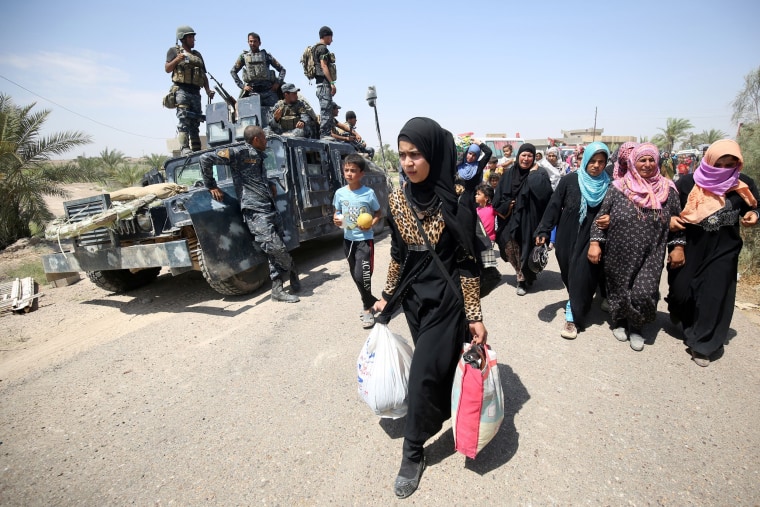
Fallujah has been under ISIS control for more than two years. Karma fell under the militants' control 12 months ago and life under the jihadis was grim, according to residents who spoke to NBC News from the refugee camp.
"I could spend all day talking about our life under the control of ISIS — at the end you won’t believe it," Shafi said. "The last five months, we used to live on eating palm dates and yogurt. We did not have power, water, food and medicine."
Shafi worked as an engineer at Fallujah's hospital before ISIS overran large areas of his country in summer 2014 — then resorted to making a living as a shepherd.
Stories such as his are common at the camp.
Yasmeen Ghazi, 10, said that when ISIS ruled the town they "ordered my mother to wear the niqab," referring to the Muslim veil that covers everything but the eyes. "She did not want to do that, but my father told her she must do that otherwise they will kill him," she added.
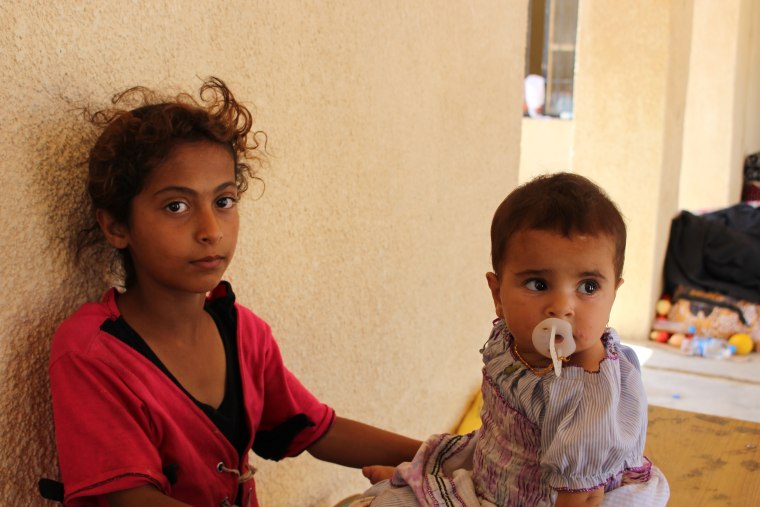
ISIS executed Ahmed Abed Ouda's 27-year-old son in March for standing up to the militants.
"They wanted him to join them and he refused," said the bereaved 76-year-old father. "Therefore they claimed that he is a cooperating with Iraqi forces."
Layla Fakhri, 36, said one of her 19-year-old relatives was executed because of allegations he was collaborating with the government.
Related: What's Really Behind the Stalled Fight for Fallujah?
Seventeen-year-old Laith Sabah recounted how his father wouldn't let him out of the house for fears he would be forced to join or killed.
The town was "separated from the outside world" because cellphones were banned, Sabah said.
"If ISIS discovered that someone was using a cellphone, or he has a satellite dish, they would execute them," he added.
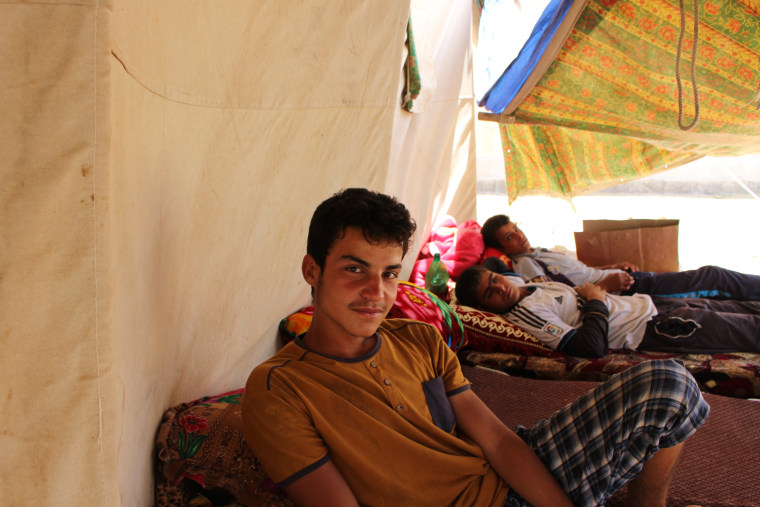
Local police say half of the buildings inside Karma have been destroyed while the rest have been rigged with explosives by ISIS.
Although ISIS has now left Karma, the troubles of its residents are far from over. Iraqi security forces have taken most men over the age of 15 to a separate location for interrogation.
"We have to do our security checks [to find out] about all those who are involved in terrorist activities," explained local police chief, Col. Midhat Abdulmehsen. "We have intel information and lists of names of all those terrorists. We will set innocents free and keep terrorists."
Abdulmehsen said the process is expected to take between five to 10 days but "sometimes it takes longer."
For the 250 women, children and elderly at the makeshift refugee camp, the wait has seemed interminable.
"We want the ISF [Iraqi security forces] to release our innocent sons," said Shafi the engineer, whose two sons aged 21 and 22 were taken away for interrogation. "If they prove that one of these men is affiliated in one way or another with ISIS, they can keep them. But they must release those who are innocents."
Fakhri's husband also was separated from the family.
"He was not an ISIS militant — he is a shepherd," she said. "He hates ISIS."
The process has been particularly traumatic for children such as 10-year-old Yasmeen.
"I want to know where my father is now," she said. "I need him to be with us. He is the only one who knows how to protect us."
Separated from their fathers and sons, remaining refugees are now living without water or electricity in what is essentially a desert on the edge of the town. The women and children are housed in a school building, many of them sleeping in a corridor, and elderly men are living in two large tents.
The mood inside the camp is one of desperation and many of the men are so old or sick that they can hardly walk.
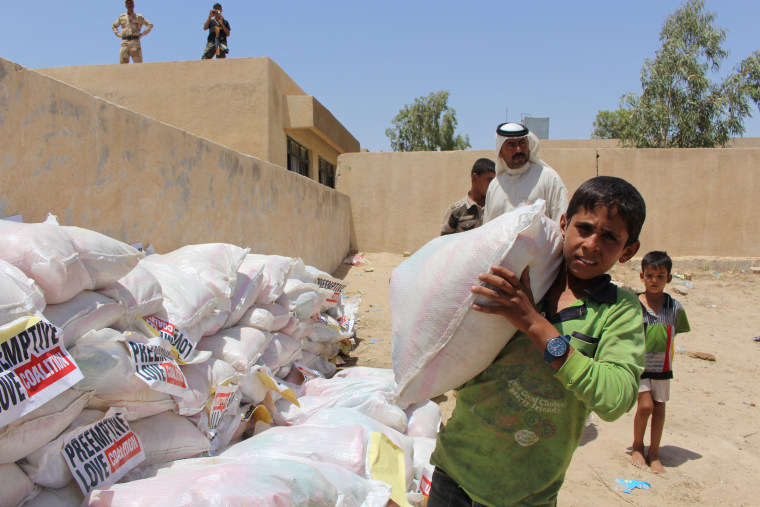
Residents say they have received no government aid and are surviving on meals provided by local tribesmen. The first aid trucks, from a U.S.-based non-governmental organization called Preemptive Love Coalition, arrived during NBC News' visit.
"I am an old, sick man. I have many diseases and I need medicine," said grieving father Ouda, who told NBC News he has been accused by members of the pro-government Shiite militias of colluding with ISIS.
Despite all that's gone against him, he tries to maintain a facade of optimism.
"All I have to do is to smile," he said. "I smile... because this is the only thing that I can give to others. Therefore, I keep this smile upon my face although I am broken on the inside."